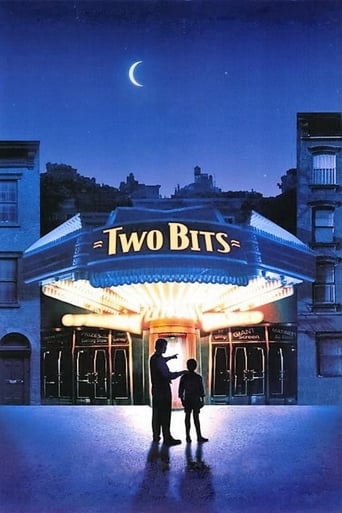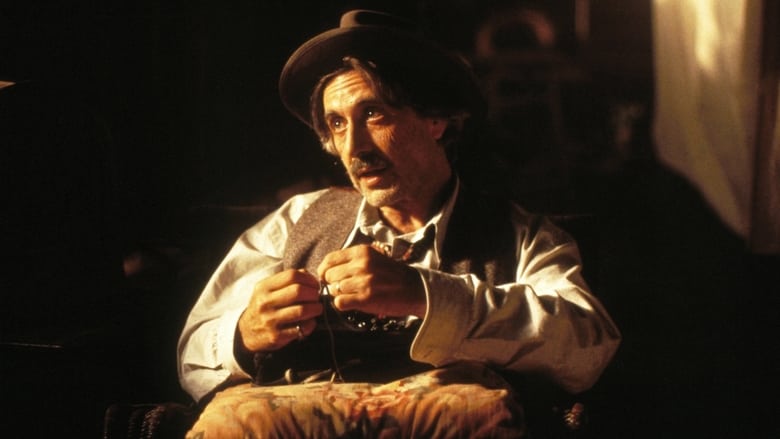

Two Bits (1995)
It's a hot summer day in 1933 in South Philly, where 12-year old Gennaro lives with his widowed mom and his ailing grandpa, who sits outside holding tight to his last quarter, which he's promised to Gennaro and which Gennaro would like to have to buy a ticket to the plush new movie theater. But grandpa's not ready to pass on the quarter or pass on to his final reward: he has some unfinished business with a woman from his past, and he enlists Gennaro to act as his emissary.
Watch Trailer
Cast


Reviews
This movie was passably interesting but I found the readers' comments even more interesting. Obviously both readers, writer, director, et al. are of today's generation of takers who don't have the least idea about what life was life in those terrible days. The central figure, a 12 year old boy who wants to go to the movies, is repeatedly seen trying to cadge a quarter from his dying grandfather.Out of compassion, a grocer who is overextended giving credit to his impoverished neighbors and forgives their small thefts, gives the kid a nickel for a job the kid never does. A compassionate doctor, who himself is nearly as bad off financially as his patients, gives the kid a dime for a job the kid never does. Finally the kid badgers his mother into giving him her last dime for attending to his grandfather's dying wish. This the kid does, in a really great scene. But he gets to the theater too late for the twenty five cents early admission price. Now the price is fifty cents, a seemingly hopeless sum.This was an absurd price for a movie ticket in those days. I recall ten or fifteen cents for a kid and two bits for adults. But fifty cents then was a good pay for a day's hard work by a man. As Steinbeck wrote of those days regarding a California farmer's view of fair wages: "A red is any son of a bitch who wants five cents an hour when I'm paying four." I got forty cents per month per customer for getting up at 4:00 am delivering newspapers door to door, and had to pay the company for the papers whether the customer paid me or not.Back to the movie -- Then the grandfather dies and, miraculously, the kid finds a quarter in the dirt nearby. And off he goes to the theater, splurging the whole fifty cents. Not a penny's worth of character development here, although the opportunity to do so was palpable. What a message to send the spoiled brats of today who seem to think they have a God-given right to live off of their parents and grandparents until the old folks die. When that happens we're going to have a hell of a depression. Which we need like a hole in the head. Today homeless people are living in parks and riverside camps and in alleyways behind restaurant dumpsters in the same terrible conditions and nearly the numbers we had during the depression era. The only difference is the modern stainless steel shopping carts they commandeer to move their possessions. But nobody seems to bother counting them, much less doing anything about their plight. We just don't want to see them and so, miraculously, they aren't there. This play could have been redeemed if the kid had foregone his utterly selfish obsession to go to the movie, and had paid the doctor and the grocer the unearned 15 cents they had given him, and had given his mother back her dime plus the two bits he "inherited" from his grandfather. Or would that have been a politically incorrect message to send to the children of today? Twelve year is not by any means too young for a child to be aware of the economic burdens parents have today, and certainly wasn't the case back in the thirties. I vividly remember when I was about 12 and spent a summer on my grandfather's ranch -- which he had lost long before to the mortgage holder who let him and grandma live there until he died on the land he and his parents had owned for nearly a century. He taught me how to play poker, so well in fact that by the time my vacation was over, I had a pretty fair stack of pennies, nickels, dimes and quarters which I kept stacked on the kitchen table with the sugar bowl and salt and pepper shakers.I really felt bad about taking the money -- although God knows the old man had lost his ranch in large part because of his gambling and hell-raising youth -- and so when my folks picked me up I "forgot" my small hoard of possibly three-four dollars, which was big money to me too. Later I got a letter from my grandmother noting my gesture, but letting me know that my grandfather was deeply hurt because a 12 year old kid had felt sorry for him.My grandfather taught me to play a pretty good game of poker too, which I put to good use in the Army and later when I had to play "poker" with the insurance companies for much higher stakes. Like the man used to sing, "You've got to know when to hold 'em and know when to fold 'em."Anyhow, TWO BITS was a big disappointment to me for these reasons. Obviously, I'm not at all happy with the state of affairs in our society these days. If you want more lectures along these lines, see our website (www.networkcentralca.net) based on the 1976 blockbuster movie NETWORK where Paddy Chayefski -- also a Depression era child -- famously satirized and forecast the sorry state of affairs of our news media and economy. Some day a more vital culture, whether Chinese or Mexican or Muslim, is going to eat us alive, and if you are around then and don't know why, remember TWO BITS.Lew Warden
This movie is beautifully done. It is one of my favorites. It is a glimpse at another time. It is a movie about values. The whole movie is about one big day in the life of a boy growing up in the depression in Philadelphia and the wisdom his grandfather passes on. It is a touching and rewarding movie. The hopelessness of the depression comes out effectively in the movie. Gennaro and Tullio are just ordinary kids that aren't perfect. There is an interesting interplay between a child's honest selfishness and the relationship between wanting and needing. Pacino: "Your heart wants, your belly needs." Wanting is good because it requires hope. Many touching lines between Pacino (grandfather) and Barone (Gennaro). There is some humor also. Favorite line: Gennaro- "There's no milk!" See it and find out why I liked that line!
Lack of action makes the audience pay attention to the characters, their thoughts, their needs and wants -- but especially their relationships with each other. This cast is outstanding in conveying the thoughts and feelings of persons experiencing the pain and suffering of the depression, yet ever remindful of each others' wants and needs. I loved every minute of it!! The second time through -- and I want to buy it to be able to experience it as often as I need this kind of reminder . . . and to share with my family, especially my grandkids.
I love a nice drama as much as anyone, and have always been a sucker for a memoir of a boy reminiscing about that special time spent with Grandpa, long, long ago.My guess is that the title Two Bits was chosen for this meaningless piece of drivel because `Plug Nickel' and `A Complete Waste of all our Time' were both already taken.James Foley reasserts his position as number one handholder to the stars'(drama)-the type of guy who is credited as director (with all the associated headaches) even though the project is controlled creatively, entirely, and usually disastrously by a single minded, self-promoting star'(in this case Al Pacino). The directorial talent and skills that seemed so promising in At Close Range' and even After Dark My Sweet' are far in the past now, for Mr. Foley, sadly.If Mr Pacino saw this as possibly his own personal Death of a Salesman', it's unfortunate that the salesman was no where to be found.I would talk more about the story if I had the slightest idea what was so important about it to bring it to film-an immigrant boy, his widowed mom, and a crotchety old Grandpa the standard setup for today's derivative and ineffective sitcom.Pass. Pass. Pass




